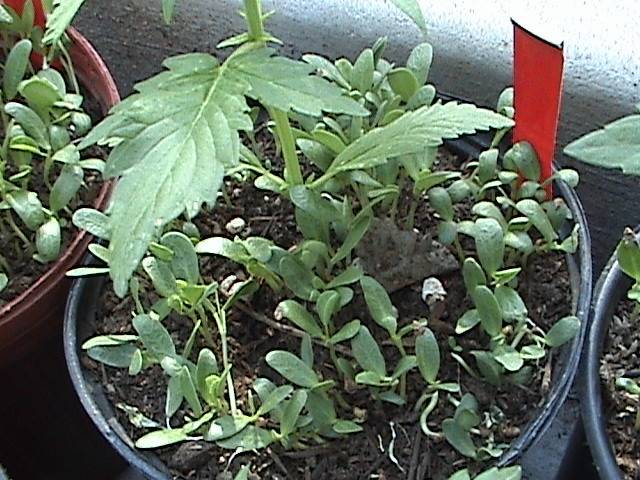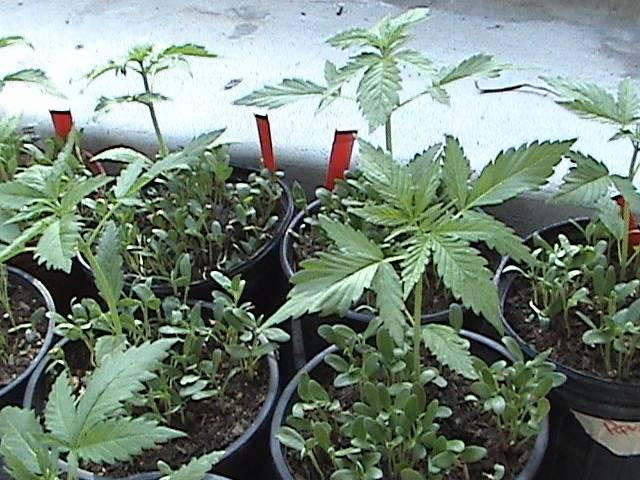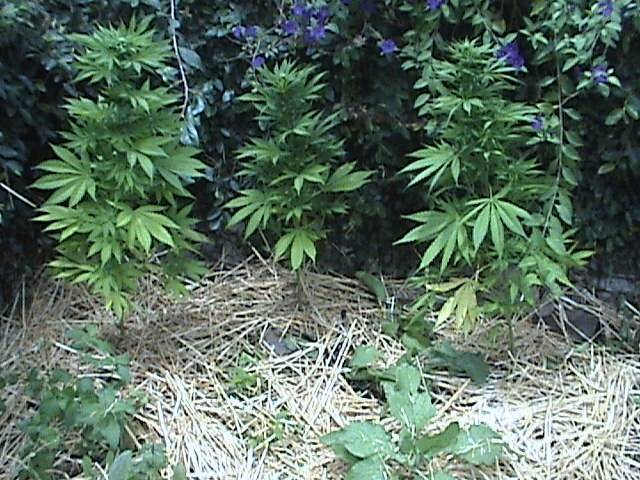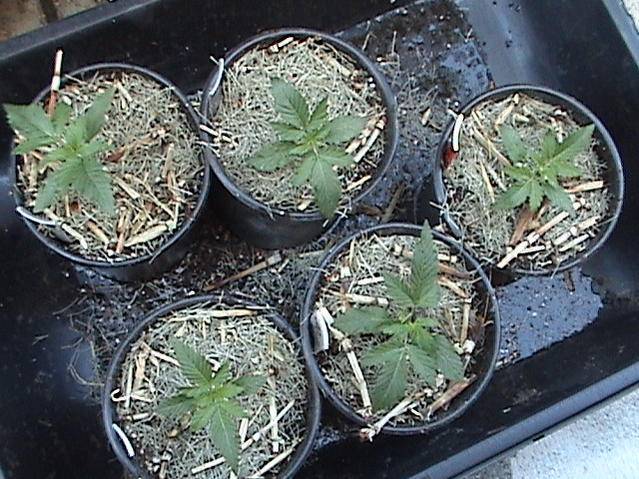-
ICMag with help from Landrace Warden and The Vault is running a NEW contest in November! You can check it here. Prizes are seeds & forum premium access. Come join in!
You are using an out of date browser. It may not display this or other websites correctly.
You should upgrade or use an alternative browser.
You should upgrade or use an alternative browser.
Mulch. Just do it.
- Thread starter Dignan
- Start date
i didn't notice any benefit to the clover. i grew it for the 6 weeks of veg then cut at soil level and let tops decay. if anything i think it may have sucked up some of the nitrogen from my nutes because plants showed early to mid flower N deficiency. i lost lots of leaves before blood meal kicked in. on further research, i found that it takes months for the bacteria to break them downView Image
many thanks to you for sharing your experience!
so you won't be using it again? or would you modify the type of cover crop/plant it more sparsely/ cut it earlier?
did you find any benefits described by other users? such as moisture retention or improved soil texture?
i didn't notice any benefit to the clover. i grew it for the 6 weeks of veg then cut at soil level and let tops decay. if anything i think it may have sucked up some of the nitrogen from my nutes because plants showed early to mid flower N deficiency. i lost lots of leaves before blood meal kicked in. on further research, i found that it takes months for the bacteria to break them downView Image
To break what down? Sorry if you posted this already but which species of clover did you use.
Varieties of clover are definitely used agriculturally to infuse N into the soil but who knows the variance between indoor and outdoor.
It may have been something else causing your apparent nutrient problems(?)
MadL commented that clover won't fix N in the soil unless the soil needs it AND it's in direct sunlight. That changes things.
This sounds like conjecture. Was there supportive evidence?
Hard to imagine using one of the field clovers in a container. If you were going to do this you definitely want to use the Dutch White Clover varieties.
S
SeaMaiden
My initial 'run' of fenugreek seems to show that it stays quite small. Also, it was begun inside, in a shaded, south-facing window, then moved to a greenhouse where it has remained. I have not, however, tried it as a ground-cover or living mulch, or green manure. If it really stays small then that alone means it will lend itself to containers much more easily.
hey guys- it was red clover. i got a lb of it to overseed my wildflower garden and though i'd try it as a companion plant. after further research, i found that specific soil based bacteria are required for nitrogen fixation and later for the nodules to release the N for plant uptake. initially clover is a net user of nitrogen."Except for when first seeding clover, nitrogen is not a necessary element to add to legume species such as clover. When first seeding though, add 20 pounds of nitrogen per acre of clover seeded. After the second year, only phosphates and potash should be needed.
Read more: The Best Fertilizer for Clover | eHow.com http://www.ehow.com/facts_8244828_fertilizer-clover.html#ixzz1z2zuqNJK
Read more: The Best Fertilizer for Clover | eHow.com http://www.ehow.com/facts_8244828_fertilizer-clover.html#ixzz1z2zuqNJK
i have ran fenugreek fine as a gound cover in small contaiers...pretty sure i shared images on the OFC



i ran a few plants,same strain with and some with out...the fenugreek canna lagged at first but then took off and really outshined everything with out a living ground cover...
since growing more then one plant in a small container,even when amended; FPE & ACT helped a ton in keeping soil balanced..
fenugreek doesnt like high temps so seeds & dies out during flower,giving great mulch and new seed to sprout once huge cola canopy begins to really swell.
here the fenu loved girls now in the ground

& horsetail is a outstanding mulch as well,dry & use to help start ground covers or alone

hth
i ran a few plants,same strain with and some with out...the fenugreek canna lagged at first but then took off and really outshined everything with out a living ground cover...
since growing more then one plant in a small container,even when amended; FPE & ACT helped a ton in keeping soil balanced..
fenugreek doesnt like high temps so seeds & dies out during flower,giving great mulch and new seed to sprout once huge cola canopy begins to really swell.
here the fenu loved girls now in the ground
& horsetail is a outstanding mulch as well,dry & use to help start ground covers or alone
hth
Amber Trich
Active member
fenugreek smells soooo good. its the best.
thanks for the heat tip darc, that must be why mine struggled the only time i grew it
jammie right on about the red clover needing inoculation. just learned red clover nodules will be pink on the inside if they have the proper nfixing bacteria.. pretty!
thanks for the heat tip darc, that must be why mine struggled the only time i grew it
jammie right on about the red clover needing inoculation. just learned red clover nodules will be pink on the inside if they have the proper nfixing bacteria.. pretty!
This sounds like conjecture. Was there supportive evidence?
No clue. That's just a quote from MadL
M
MrSterling
About the nitrogen fixing properties of clover, clover doesn't fix nitrogen for the soil directly. It fixes N for itself, allowing it to not have to use N from the soil. When the plant dies, or is tilled in, the nitrogen in the clover is broken down by the soil life and made available for plant use. So for clover to fix nitrogen for your cannabis plants, it would have to grow to the age where it can fix nitrogen (a couple months I believe), and then it would have to die and break down before its nitrogen could be used by your cannabis plant. Clover does not pull nitrogen from the air and pass it on to your pot.
Here's this one - http://aces.nmsu.edu/pubs/_a/a-129.pdf, and a quote:
"The amount of nitrogen returned to the soil during or after a legume crop can be misleading. Almost all of the nitrogen fixed goes directly into the plant. Little leaks into the soil for a neighboring nonlegume plant. However, nitrogen eventually returns to the soil for a neighboring plant when vegetation of the legume dies and decomposes."
This study - http://www.tandfonline.com/doi/abs/10.1080/03015521.1982.10427906 - seems to support what mad was saying, which is that if the soil already has a high amount of nitrogen, the clover will use it instead of fixing. I'm willing to bet however that "high amount of nitrogen" means chem fertilizers.
The question is, is clover still a good cover choice indoors? It should help keep the soil evenly moist, no more crusting tops. Theoretically its rootzone should help your bioherd(no?). If you use mycorrhizal fungi on the clover shouldn't you have an increased chance of helping spread that fungi to your plants roots?
Here's this one - http://aces.nmsu.edu/pubs/_a/a-129.pdf, and a quote:
"The amount of nitrogen returned to the soil during or after a legume crop can be misleading. Almost all of the nitrogen fixed goes directly into the plant. Little leaks into the soil for a neighboring nonlegume plant. However, nitrogen eventually returns to the soil for a neighboring plant when vegetation of the legume dies and decomposes."
This study - http://www.tandfonline.com/doi/abs/10.1080/03015521.1982.10427906 - seems to support what mad was saying, which is that if the soil already has a high amount of nitrogen, the clover will use it instead of fixing. I'm willing to bet however that "high amount of nitrogen" means chem fertilizers.
The question is, is clover still a good cover choice indoors? It should help keep the soil evenly moist, no more crusting tops. Theoretically its rootzone should help your bioherd(no?). If you use mycorrhizal fungi on the clover shouldn't you have an increased chance of helping spread that fungi to your plants roots?
MissGreenDreamz
Member
About the nitrogen fixing properties of clover, clover doesn't fix nitrogen for the soil directly. It fixes N for itself, allowing it to not have to use N from the soil. When the plant dies, or is tilled in, the nitrogen in the clover is broken down by the soil life and made available for plant use. So for clover to fix nitrogen for your cannabis plants, it would have to grow to the age where it can fix nitrogen (a couple months I believe), and then it would have to die and break down before its nitrogen could be used by your cannabis plant. Clover does not pull nitrogen from the air and pass it on to your pot.
Precisely what I found as well. They're just a holding tank. There are a lot of factors that can happen here for anyone to just throw the cover crop strategy out the window. You could easily seed one container heavier than the other, drastically influencing anything from H2O content or retainability (affecting your microherd population and activity), how much N is stored to be released later, to inhabitants you may have good or bad... and even blue mold etc etc...
If you felt you had overkill, you could weed more of it out. If you throw away your greens you're throwing away anything they borrowed from your soil.
A lot of variances to be had in this type of scene. I would love to see a controlled experiment with different types of covers, different density of covers, some untouched, some trimmed, etc...would all have to be the same type of plant of course.
Anyway, the beauty of this strategy is that as the plant approaches the flower stage, it drowns out the light to the cover, causing it to die back, offering the N back to the plant right as its going into flower when they'd need it. I think you'd need to have that extra time in the beginning to veg every time tho which is tricky... its so nice to have a nice carpet of greens to pop a rooted baby into.. so you'd need two sets for a flawless cycle. rotating containers can work, and even planting cover crops in the off-duty containers might be a good way to keep your soil alive and kicking.
Precisely what I found as well. They're just a holding tank. There are a lot of factors that can happen here for anyone to just throw the cover crop strategy out the window. You could easily seed one container heavier than the other, drastically influencing anything from H2O content or retainability (affecting your microherd population and activity), how much N is stored to be released later, to inhabitants you may have good or bad... and even blue mold etc etc...
If you felt you had overkill, you could weed more of it out. If you throw away your greens you're throwing away anything they borrowed from your soil.
A lot of variances to be had in this type of scene. I would love to see a controlled experiment with different types of covers, different density of covers, some untouched, some trimmed, etc...would all have to be the same type of plant of course.
Anyway, the beauty of this strategy is that as the plant approaches the flower stage, it drowns out the light to the cover, causing it to die back, offering the N back to the plant right as its going into flower when they'd need it. I think you'd need to have that extra time in the beginning to veg every time tho which is tricky... its so nice to have a nice carpet of greens to pop a rooted baby into.. so you'd need two sets for a flawless cycle. rotating containers can work, and even planting cover crops in the off-duty containers might be a good way to keep your soil alive and kicking.
M
MrSterling
I guess I'm hesitant that the drowning out would occur rapidly enough. It takes a long time for a plant to die and decompose. I suspect the clover would begin to fail and kick the bucket, but I can't see it breaking down in time to help. Anyone have any experience with this specific aspect?
MrSterlingI guess I'm hesitant that the drowning out would occur rapidly enough. It takes a long time for a plant to die and decompose. I suspect the clover would begin to fail and kick the bucket, but I can't see it breaking down in time to help. Anyone have any experience with this specific aspect?
I can offer up this observation: last fall after the vegetable plants in the raised beds had been harvested and composted, I planted the White Clover in the beds and some of the seeds sprouted but most stayed dormant until early spring and they grew to 8 - 10" in a few weeks.
About 6 weeks ago I chopped down the four Comfrey plants and the last thing that I need was more Comfrey 'tea' so I used the leaves in the traditional method and placed the leaves on the beds covering the White Clover plants.
I covered the Comfrey with a combination of black leaf mold and compost that I'd made late last summer. A few days after that I checked the beds and felt the top of the soil/compost and there was a slightly elevated warmth which I figured was the green plant material breaking down.
About 2 weeks later I pulled a couple of shovels of top soil and all of the plant material (Comfrey & Clover) were completely decomposed. I planted the vegetable starts and everything I planted took off and are still racing upward.
I'll be doing this process again this year - plant clover, let it winter over, bring it up to several inches and cover with Comfrey and compost.
Just my experience........
CC
M
MrSterling
Clakamas, It sounds like you're using it as intended. I use it in the garden to till in, and mow down for my compost. I'm wondering specifically about indoor potted use; I can't see it breaking down under a plant's shade quickly enough to help the plant. Better to raise the clover elsewhere, compost it, and then add if the clover's nutrients are needed.
Neither can I.........Clakamas, It sounds like you're using it as intended. I use it in the garden to till in, and mow down for my compost. I'm wondering specifically about indoor potted use; I can't see it breaking down under a plant's shade quickly enough to help the plant. Better to raise the clover elsewhere, compost it, and then add if the clover's nutrients are needed.
M
MrSterling
So have we been on the wrong trail all along with clover? I've spent years hearing organic friends tell me it helps give other plants nitrogen while it grows; and a little research turned that on its head.
MrSterling
There are definite benefits to using cover crops irrespective of any 'N' benefit or whatever is the latest 'nute of the week'
That isn't necessarily the point - the question for me is pretty simple: "How would growing Clover in an artificial soil benefit adjacent plants?"
***shrug***
There are definite benefits to using cover crops irrespective of any 'N' benefit or whatever is the latest 'nute of the week'
That isn't necessarily the point - the question for me is pretty simple: "How would growing Clover in an artificial soil benefit adjacent plants?"
***shrug***
M
MrSterling
There are certainly benefits other than fixing nitrogen, but let's sweep away the myths while we're at it. No reason to believe it's doing something it's not. I think it still should be an effective living mulch.


